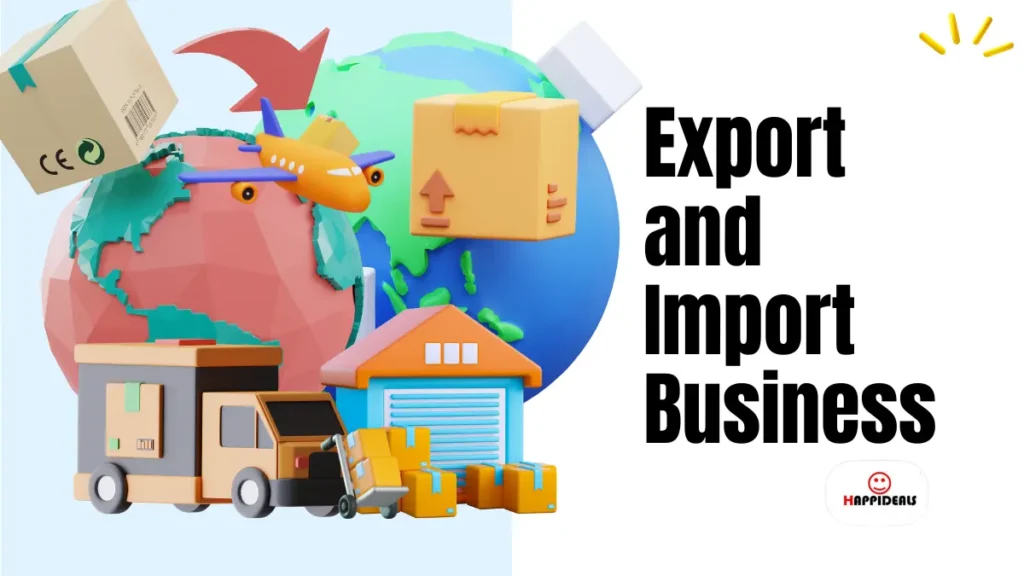Export and Import Business: A Complete Guide to Start
For entrepreneurs wishing to access the worldwide market, the export and import industries offers a profitable opportunity. With the rise of globalization and trade agreements, the barriers to entry have significantly reduced. Whether you are a new entrepreneur or an experienced one, this guide will walk you through all aspects of the export and import business, including ideas, investment requirements, and profitable opportunities.
Introduction to Export and Import industries
The export and import business involves trading goods or services across international borders. Import refers to purchasing goods from other countries, while export means selling goods to foreign markets. This business has gained immense popularity as it offers a great return on investment and provides opportunities to connect with global markets.
One of the most attractive aspects of this business is that you can start small and gradually scale up. Whether you are interested in agricultural products, manufactured goods, or even niche items, there are ample opportunities to explore in the export and import industries .
Minimum Investment for Import Export Business
The minimum investment required for an import export business largely depends on the nature of the products and the scale of operations. For small-scale businesses, an investment of INR 50,000 to INR 1,00,000 is sufficient to get started.
Some of the major costs include:
- Registration fees (Import Export Code – IEC)
- Initial stock purchase
- Shipping and logistics costs
- Marketing expenses
- Documentation and compliance charges
By starting with lightweight, high-value products, you can minimize your initial investment while maximizing profits.
How Much Capital Is Required to Launch an Indian Import-Export Company
If you are planning to start an export and import business in India, you must account for certain fixed and variable costs. Here’s a breakdown of approximate costs:
- IEC Code Registration: INR 500-1,000
- Product Procurement: Depends on the product type
- Shipping & Logistics: INR 10,000 – 20,000 (initial shipments)
- Customs Clearance: Varies based on product and country
- Marketing & Advertising: INR 5,000 – 10,000 for digital promotion
Thus, you can begin with an investment as low as INR 1,00,000 and scale up gradually.
Export and Import Business Ideas
Here are some profitable export and import business ideas that you can consider:
- Agricultural Products: Fruits, vegetables, spices, and grains
- Handicrafts: Indian art, pottery, and textiles
- Leather Goods: Shoes, wallets, and bags
- Electronics: Mobile accessories, gadgets, and spare parts
- Pharmaceuticals: Generic medicines and supplements
- Home Decor: Furniture, carpets, and decorative items
- Textile & Garments: Fabrics, ethnic wear, and uniforms
These industries have huge demand in both domestic and international markets.
Most Profitable Export Business in India
India is a hub for many exportable products due to its rich resources and skilled labor. The following are some of the most profitable export businesses in India:
- Spices: India is the world’s largest exporter of spices like turmeric, cumin, and black pepper.
- Textiles: Cotton fabrics, silk sarees, and traditional garments have high demand globally.
- Handicrafts: Unique, handmade Indian handicrafts attract foreign buyers.
- Pharmaceutical Products: One of the top suppliers of generic medications is India.
- IT Services: Exporting software, mobile applications, and tech solutions.
Export and Import Business Examples
Some successful export and import business examples include:
- Tata Group: A pioneer in exports across sectors like automobiles, steel, and tea.
- Amul: Exporting dairy products such as milk powder and cheese worldwide.
- Balaji Wafers: Exporting snacks to the Middle East and African markets.
- Small Entrepreneurs: Exporting spices, handicrafts, and apparel to Europe and the USA.
These examples show that businesses of all scales can thrive in the export-import sector.
Import Export Business List
The following goods are perfect for the import and export industry:
- Textiles and Apparel
- Leather Products
- Handicrafts
- Agricultural Products
- Pharmaceuticals
- Processed Foods
- Electronic Goods
- Auto Components
- Furniture and Home Decor
Steps to Start an Export and Import Business in India
- Register Your Business: Choose a business structure (Sole Proprietorship, LLP, or Pvt Ltd).
- Obtain IEC Code: An Import Export Code (IEC) is mandatory for trading.
- Select Products: Identify in-demand products for export/import.
- Find Suppliers or Buyers: Use online platforms like Alibaba, TradeIndia, or Indiamart.
- Arrange Logistics: Partner with freight forwarders for shipping.
- Compliance: Ensure documentation like invoices, packing lists, and certifications.
- Promote Your Business: Leverage digital marketing to find global customers.
Benefits of Export and Import Business
- Global Reach: Access to international markets increases business opportunities.
- High-Profit Margins: Trading niche and in-demand products yields good returns.
- Low Investment: You can start small and scale up.
- Government Support: Various incentives and schemes promote exports.
Conclusion
The export and import business is a promising field that offers ample opportunities for growth and profitability. With a minimal initial investment and proper planning, anyone can start and succeed in this business. By focusing on in-demand products, understanding compliance requirements, and leveraging global platforms, you can build a thriving export-import enterprise.
Frequently Asked Questions (FAQs)
The minimum investment can range between INR 50,000 to INR 1,00,000 for small-scale operations.
Starting costs depend on the product, logistics, and marketing, but you can start with approximately INR 1,00,000.
Some of the most profitable exports include spices, textiles, pharmaceuticals, and handicrafts.
You can find buyers through trade platforms like Alibaba, TradeIndia, and Indiamart, or by participating in trade fairs and exhibitions.
Essential documents include an IEC Code, commercial invoices, packing lists, and certificates of origin

